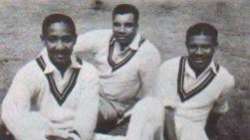The cricket world is mourning the loss of West Indies great Sir Everton Weekes, who passed away on Wednesday. He was the last of the famous 'Three Ws' of the West Indies, which included Sir Clyde Walcott and Sir Frank Worrell. The three formed a fearsome batting trio during the 1950s for the side and were conferred with a number of honours post their cricketing careers. Incidentally, all three cricketers were born within a few miles of each other in Barbados. Rumour has it that they were delivered by the same midwife, too.
As the cricket fraternity continues to pay its rich tributes to Sir Everton Weekes, we take a look at the glorious career of the 'Three Ws'.
Sir Frank Worrell:
The first Black captain in the history of West Indies cricket, Worrell was a right-handed batsman who represented the side in 51 Test matches, scoring 7,141 runs at an average of 49.48.
He was named the Wisden Cricketer of the Year in 1951, a year after he scored a terrific double-century (261) against England which eventually aided the side to a 10-wicket victory in Nottingham. Worrell ended up as the highest scorer in the series, with 539 runs in four matches. The Windies won the series 3-1.
He led West Indies to the tour of Australia in 1960-61, where the Australians were left so impressed with Worrell that they named the trophy after him. Even today, the winner of the Test series between Australia and West Indies is awarded the Frank Worrell Trophy.
Worrell retired from the game in 1963 and was knighted for his services to cricket a year later. He was diagnosed with Leukaemia in 1967 and passed away in the same year.
Sir Clyde Walcott:
At the age of 20, he scored an unbeaten 314 for Barbados while forging an unbroken 574-run stand with childhood friend Worrell (255*), setting a then-world record for highest partnership in first-class cricket.
He made his debut for the Windies two years later against England and went on to appear for the side in 44 Tests, scoring 3,798 runs with an average of 56.68. In the same series against England in which Worrell ended as the highest scorer, Walcott scored an unbeaten 168 at Lord's to help the team register its first Test victory on English soil.
With disputes over pay, he announced his international retirement in 1960. He was the chairman of West Indies selectors from 1973 to 1988 and managed the side's World Cup-winning teams in 1975 and 1979. In 1997, he became the first non-white chairman of the International Cricket Council and oversaw the match-fixing investigations which rocked the cricket world at the time.
He passed away in 2006 at the age of 80.
Sir Everton Weekes:
Widely regarded as the best of the three batsmen, Weekes was born in 1925. He made his Test debut with Walcott in 1948. In the same year, he recorded five successive Test centuries and reached 1,000 Test runs in merely 12 innings - one less than Sir Don Bradman.
Justifiably, he drew comparisons with the Australian great. Former Australian cricketer and renowned cricket commentator, late Richie Benaud said that Weekes was the closest a batsman has been in style and class to Bradman.
Weekes represented West Indies in 48 Tests, scoring 4,455 runs at an average of 58.61. This included 15 centuries and 19 half-centuries. His average is the eighth-highest in the history of Test cricket (minimum 20 Tests) and second-highest among West Indians.
-
In 1954, all the three batsmen which formed the legendary 'Three Ws' slammed centuries in an innings against England in Trinidad. While Weekes scored a double-century (206), Worrell scored 167 and Walcott scored 124.
The 3Ws Oval at the University of the West Indies is named in their honour, with a monument to the three men standing opposite. The stadium was used during warm-up matches for the 2007 World Cup.

